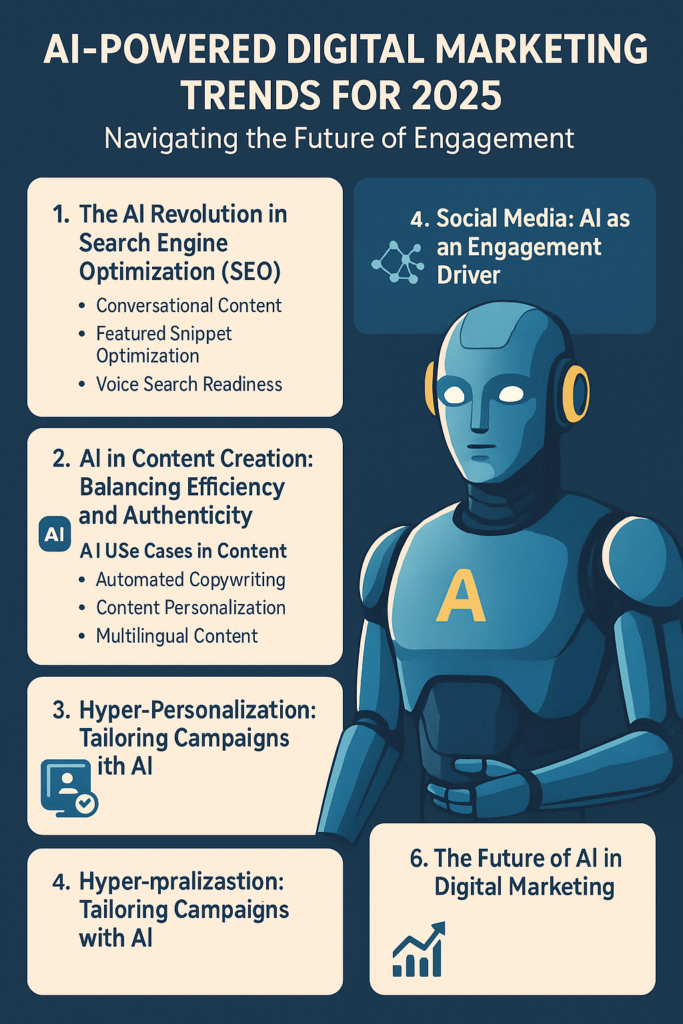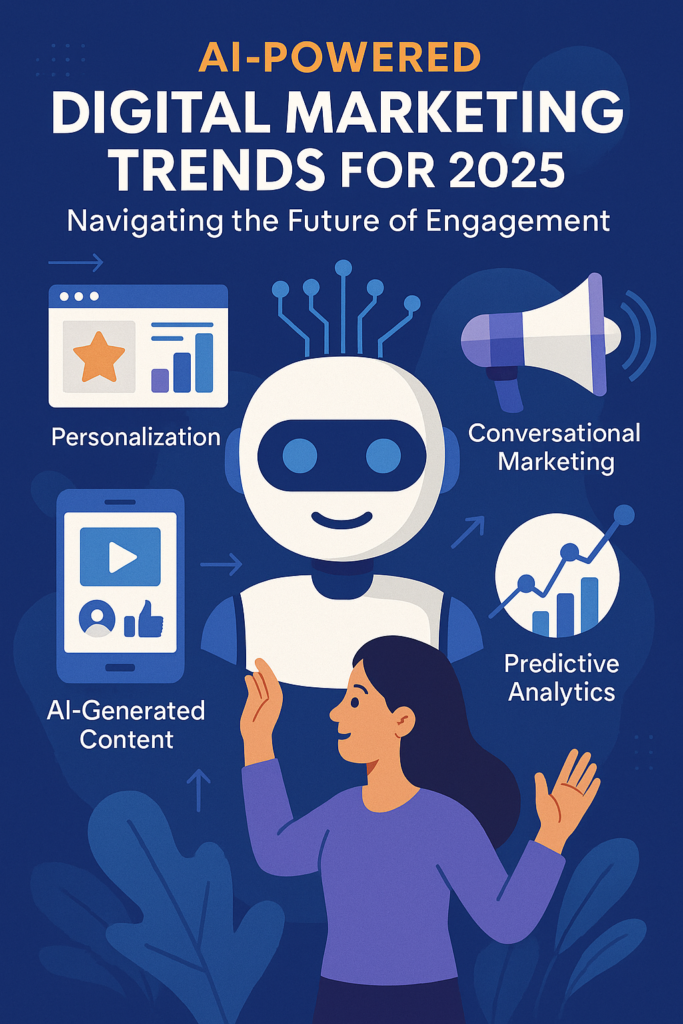
AI-Powered Digital Marketing Trends for 2025: Navigating the Future of Engagement
The digital marketing landscape is undergoing a profound transformation, and by 2025, artificial intelligence (AI) stands as a pivotal force in this evolution. From redefining search strategies to enhancing customer engagement, AI is reshaping how brands connect with their audiences. With over 70% of marketing strategies already leveraging AI, and projections indicating a rise to 75% by year-end, businesses must adapt to remain competitive. Yet, this transformation brings forth worries regarding the genuineness of content and the safeguarding of personal information. This article explores the most impactful AI-driven trends in digital marketing for 2025, offering insights into opportunities, challenges, and strategies for success.
1. The AI Revolution in Search Engine Optimization (SEO)
By 2025, AI-driven search technologies are fundamentally altering the landscape of search engine optimization (SEO). Tools like Google’s AI Overviews are providing instant answers directly on search result pages, reducing click-through rates to websites by up to 20% in some industries. This shift toward “zero-click searches” forces marketers to rethink traditional SEO strategies.
To succeed, businesses must optimize content for AI algorithms that prioritize natural language processing and semantic understanding. For example, instead of targeting isolated keywords, marketers are focusing on conversational queries like “What’s the best eco-friendly running shoe for 2025?” Structured data, such as schema markup, is critical to ensure content appears in AI-generated summaries. Emerging platforms like SearchGPT further emphasize the need for context-driven content.
Key Strategies for 2025:
Conversational Content: Writing that feels like a natural, spoken dialogue to align with how users search.
Featured Snippet Optimization: Structuring content to appear in AI-generated answer boxes.
Voice Search Readiness: Optimizing for voice assistants like Siri and Alexa, as 40% of searches are now voice-based.
Challenge: Reduced organic traffic from AI-driven search impacts websites reliant on informational queries. Marketers must diversify their channels, such as social media and email marketing, to maintain visibility.
2. AI in Content Creation: Balancing Efficiency and Authenticity
At the core of digital marketing lies content, and AI technologies are revolutionizing its production, making it more efficient and scalable. Tools like ChatGPT and Jasper are used by over 50% of marketers to generate blog posts, social media captions, and email campaigns. These tools can produce high-quality drafts in seconds, saving significant time and resources.
However, excessive reliance on automation in content creation can result in material that feels mechanical, underscoring the importance of human creative input. By 2025, top brands are successfully integrating AI’s efficiency with the irreplaceable creativity of human input. For example, a fashion retailer might use AI to generate product descriptions but rely on human editors to infuse them with storytelling that resonates with their audience.
Key Applications of AI in Content Creation:
Automated Copywriting: Generating tailored ad copy, email subject lines, and social media posts.
Content Personalization: Using user data to create customized content, such as tailored blog recommendations.
Multilingual Content: AI translation tools enable brands to create localized content for global markets, with 65% of businesses using AI for multilingual campaigns.
Challenge: Over-automation can make content feel robotic, so human creativity is crucial. Brands must prioritize authenticity, using AI as a tool rather than a replacement for human ingenuity.

3. Hyper-Personalization: Tailoring Campaigns with AI
Through the analysis of consumer data, including browsing patterns and past purchases, AI enables the creation of highly personalized marketing campaigns. Research indicates that 80% of consumers are more likely to purchase from brands that offer tailored experiences, making personalization a critical driver of revenue.
In 2025, AI-powered personalization is evident across multiple channels:
Email Marketing: Platforms like HubSpot offer features that optimize send times and personalize content, enhancing campaign effectiveness.
Website Experiences: Dynamic content adjusts in real-time based on user behavior, such as showing tailored product recommendations.
Targeted Advertising: Artificial intelligence technologies fine-tune where ads appear on major platforms like Google and Meta, ensuring they reach the most relevant audiences.
For example, a travel company might use AI to recommend vacation packages based on a user’s past trips, budget, and preferences, creating a seamless customer experience that fosters loyalty.
Challenge: Personalization relies on consumer data, raising privacy concerns. With regulations like GDPR and CCPA tightening, brands must be transparent about data collection and usage. Providing clear and honest information about how data is used helps build trust and confidence among users.4. Social Media: AI as an Engagement Driver
Social media platforms in 2025 rely heavily on AI to curate feeds, predict trends, and boost engagement. Algorithms on platforms like Instagram, TikTok, and X prioritize interaction over follower counts, requiring marketers to adapt. AI-driven trends include generating visuals with tools like Midjourney, matching brands with relevant influencers, and providing real-time campaign insights.
Challenge: The fast-paced nature of social media demands constant adaptation to algorithm changes. Excessive reliance on automation can result in content that feels mechanical, underscoring the importance of human creative input to maintain engagement.
5. Ethical AI and Consumer Trust
As AI becomes central to digital marketing, ethical considerations are paramount. Consumers are increasingly aware of AI’s role in advertising, with 43% expressing skepticism about AI-generated content. In 2025, brands that prioritize transparency and ethical AI use gain a competitive edge.
Key ethical practices include:
Data Transparency: Providing clear and honest information about how data is used helps build trust and confidence among users.
Bias Mitigation: Regularly auditing AI tools to ensure fairness and inclusivity in targeting and content delivery.
Human Oversight: Although artificial intelligence is unparalleled in processing and analyzing data, it is the human elements of creativity and empathy that craft campaigns that truly resonate and leave a lasting impression.
For instance, a retailer using AI for ad targeting might implement regular audits to ensure campaigns don’t exclude certain demographics, reinforcing inclusivity and trust.
6. The Future of AI in Digital Marketing
Looking ahead, AI’s role in digital marketing will continue to expand. Emerging technologies like generative AI, predictive analytics, and augmented reality (AR) are set to redefine customer engagement. For example, AR-powered try-on features, driven by AI, are becoming popular in industries like fashion and cosmetics, allowing consumers to virtually test products before buying.
Additionally, AI is enabling smaller businesses to compete with industry giants. Affordable AI tools democratize access to advanced marketing capabilities, leveling the playing field. By 2026, it’s estimated that 80% of small businesses will use AI-driven marketing tools, up from 50% in 2025.
However, the human element remains irreplaceable. While AI excels at data analysis, human creativity and empathy create memorable campaigns. In 2025, the most successful marketers will be those who harness AI’s power while staying true to their brand’s values and their audience’s needs.
Conclusion
AI is revolutionizing digital marketing in 2025, offering unprecedented opportunities to connect with audiences in meaningful ways. From redefining SEO to enabling hyper-personalized campaigns, AI is a game-changer. However, challenges like maintaining authenticity, ensuring privacy, and navigating ethical concerns require careful navigation. By embracing AI thoughtfully and balancing it with human creativity, businesses can create campaigns that resonate, engage, and convert. As we move further into 2025, staying ahead of these trends will be crucial for marketers aiming to thrive in this dynamic digital landscape.